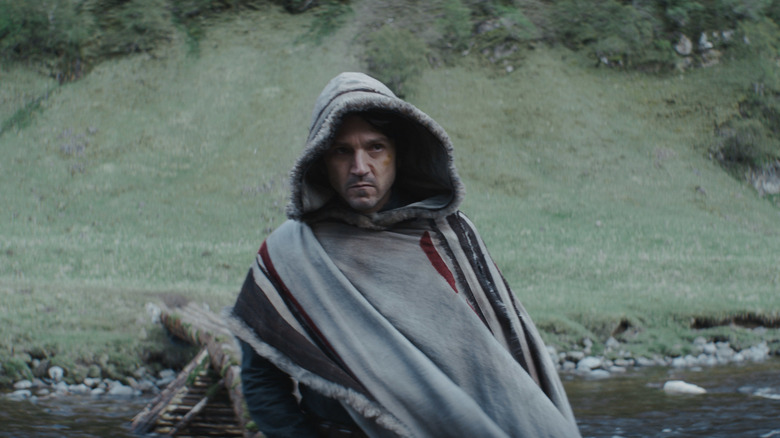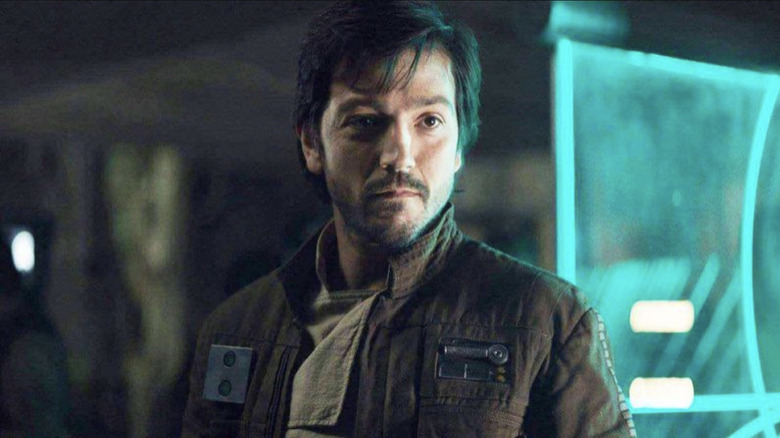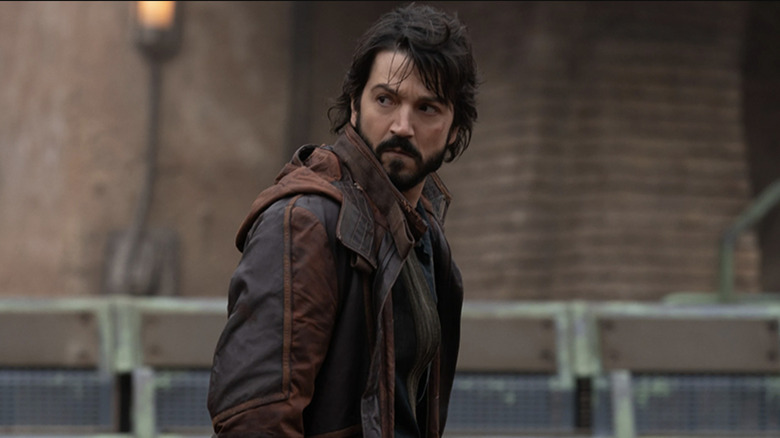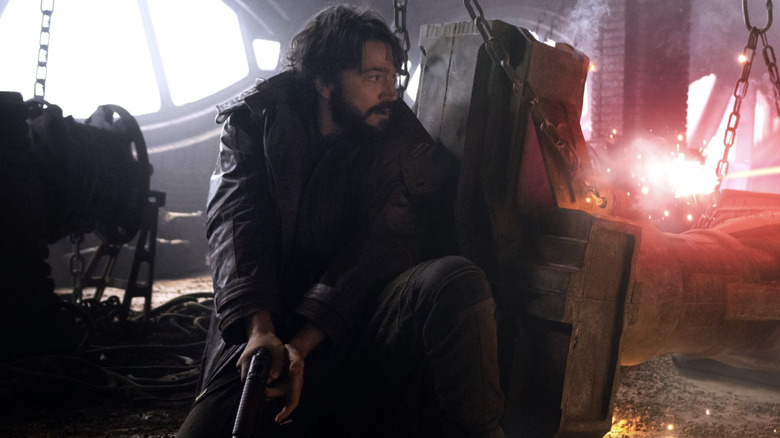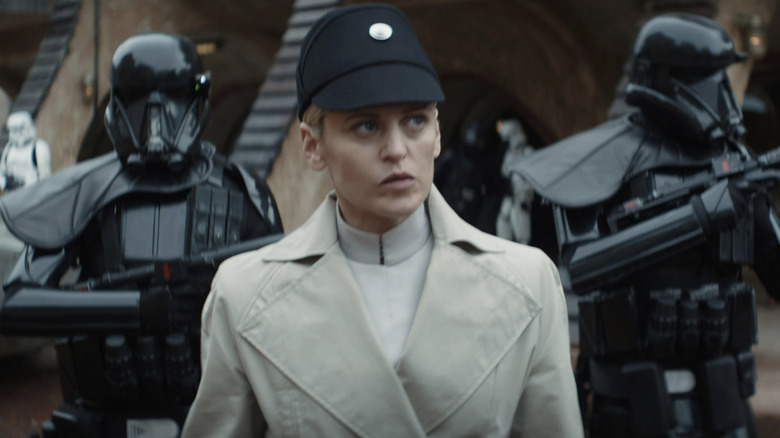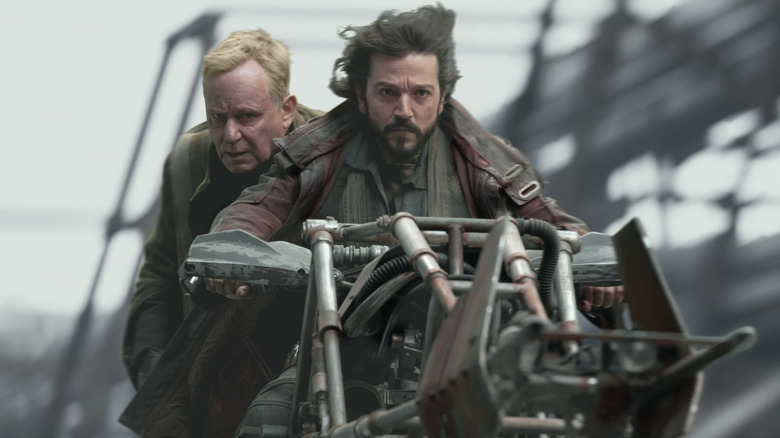Andor Is The Darkest Star Wars Story Disney Has Told Yet
This post contains spoilers for the three-episode premiere of "Andor."
In the ever-expanding library of Disney+ shows, it's becoming harder and harder for the "Star Wars" properties to differentiate their projects from one another. "The Mandalorian," "Obi-Wan Kenobi," and "The Book of Boba Fett" all feel the same, not just from an aesthetic point of view but in tone and story structure. A change of pace is desperately needed for these shows to differentiate themselves from one another.
Along comes "Andor," the latest "Star Wars" show on Disney+ and one that spins off from the events of "Rogue One: A Star Wars Story." The three-episode premiere, directed by Toby Haynes and written by Tony Gilroy, sets out to tell the backstory of Cassian Andor and the events of his life that led him to become part of the Rebel Alliance.
Whether it was part of the initial plan or not, "Andor" is a "Star Wars" story darker than anything else Disney has done up to this point. The battle between the dark side and the light that's been the focus of all the mainline "Star Wars" stories becomes morally gray with the release of "Andor," a series that juxtaposes the lightheartedness of other projects under the same banner.
The influence of Rogue One
It's unsurprising that "Andor" would feature a darker tone than what's expected from "Star Wars." After all, the series is a prequel to "Rogue One," Gareth Edwards' dark and murky exploration of the rebellion and how they stole the plans to the Death Star.
Several moments in "Rogue One" feature the story's heroes committing morally questionable acts. And interestingly enough, most of the film's darker moments have Cassian Andor at their center. Whether it was the assassination of an imperial saboteur who may know too much or the silencing of an informant so as not to get himself caught, Cassian was always willing to go to extremes to preserve the rebellion.
Compared to "Star Wars" heroes like Luke Skywalker, who seem to think twice before using lethal force, characters like Andor are far from what's expected of a protagonist in this universe. Such a notion is a good thing for the series. The grim tone of "Andor" feels like a refreshing change of pace after other "Star Wars" shows have only dabbled in darkness.
Experimenting with tonal shifts
"Obi-Wan Kenobi," the limited series released earlier this year that featured a world-weary Ben following the events of "Star Wars Episode III," experimented with a darker tone before "Andor" would fully embrace it.
Look no further than the opening scene of the first episode, which retells the night of Order 66 from the perspective of the younglings. The scene's intensity and subject matter make it by far the darkest scene in the series. The opening reminds audiences of one of the darkest acts committed by Anakin Skywalker, accentuating Obi-Wan's failure as his master and setting the stage for one of the villains featured in the limited series.
This tonally dark scene featured in"Obi-Wan" shows us that "Star Wars" isn't a stranger to darker story beats. However, they're done sparingly and primarily serve to develop the characters. So, what happens when a show like "Andor" leans more heavily into the darkness?
Darkness with a purpose
The answer to the question is a resounding yes. The series doubles down on the questionable actions Andor takes in his personal pursuits, and it's evident right away in the first episode of the series.
"Andor" and its opening sequence break many of the usual "Star Wars" conventions. From the setting where we first find Cassian Andor to how he deals with the trouble that comes his way, the show's penchant for darkness is evident. The best part of the tonal difference of "Andor" is that it's not done on a superficial level, but in service of its characters and story.
Take, for instance, the opening scene of the first episode. Cassian enters a brothel searching for someone close to him and comes up empty-handed. However, he captures the attention of two imperial contract officers who harass him and hold him at gunpoint. Cassian resists, and in the ensuing conflict, one officer is accidentally killed.
The lone surviving officer begs for his life, telling Andor they can fabricate a story to get them out of trouble. Instead, Cassian opts to shoot him in the head and kill him. Each of these events drive the narrative forward while reminding viewers what kind of a protagonist Cassian is.
Promiscuous locales and characters
Even the implication of a brothel is scarce in other corners of "Star Wars," so setting the opening of a series in such a location already accentuates the seedy world where Cassian operates.
Moreover, since "Andor" takes place years before the events of "Rogue One," the character's actions towards the imperial officers are just a hint of what's to come with the his willingness to kill to protect himself. The demise of a bad guy hasn't been this drawn out in a "Star Wars" series, either. Watching Andor hypothetically ask the officer what he would have him do in this situation makes it all feel more personal than all the bodies dropped in "Book of Boba Fett" and "The Mandalorian" combined.
The level of detail to "Andor" and its world is a large part of what makes it so effectively dark. There are consequences to every character's action, and the exploration of those consequences not only makes the show starker, but makes it feel more lived in and real (outside of the usual expert level of detail in production design that's expected from a "Star Wars" show).
Every blaster shot, every comm-link, and every daring escape attempt in the espionage world of "Andor" feels like it has a deadly consequence.
The promise of hope in future Star Wars projects
Overall, the darkness in "Andor" serves a purpose on almost every level. The characters and their inclinations propel the narrative, and the backdrop of an imperial-controlled galaxy lends the series to naturally have a gloomier disposition than something like "The Mandalorian," which takes place after the fall of the empire. The series is "Star Wars" at its grittiest, allowing for a more nuanced perspective of the conflict between Rebels and the Empire.
Only three episodes in, "Andor" has managed to give viewers a look at the darker crevices of the "Star Wars" universe, and even with all the doom and gloom, it still has the semblance of hope that all "Star Wars" projects showcase. Moreover, the assurance of hope in "Star Wars" films and shows that take place further down the timeline could be considered all the more reason for "Andor" to really revel in its darkness. Audiences knowing what happens after the series could benefit "Andor" and the grittier tone and subject matter it deals with. No matter how dark it gets, audiences know that there is still a light at the end of the tunnel.
However the rest of the series turns out, it will be fascinating to see Cassian Andor's evolution from shady character to full-on rebellion spy in a series that does its best to break the mold.
